Your cart is currently empty!
How to Pass USMLE Step 1
The USMLE Step 1 is one of the most challenging exams on your path to becoming a licensed physician in the United States. It focuses on testing your knowledge of basic medical sciences, and passing it requires a well-structured study plan, high-quality resources, and a balanced lifestyle. In this guide, we’ll cover how to pass USMLE Step 1, including foundational strategies, study materials, and how to manage family time.
1. Build a Solid Foundation for USMLE Step 1
To succeed in the USMLE Step 1 exam, mastering basic concepts in subjects like anatomy, physiology, pathology, biochemistry, pharmacology, and microbiology is essential.
- Start Early: Don’t wait until the last minute. Begin studying during your preclinical years by deeply understanding core subjects instead of just memorizing them.
- Use High-Quality Resources: Supplement your learning with textbooks and online resources like Kaplan, BRS, or Pathoma, depending on your study style.
2. Use High-Yield Books Like First Aid for USMLE Step 1
One of the most crucial resources for your USMLE Step 1 preparation is First Aid for the USMLE Step 1. It’s the go-to book for Step 1 review because of its concise, high-yield content.
- Master First Aid: Make this book your primary study guide and build upon it as you go through other resources.
- Annotation is Key: As you review practice questions from sources like UWorld, annotate First Aid with key insights. This will make your copy of First Aid an invaluable resource during final revisions.
3. Leverage UWorld for USMLE Step 1 Success
UWorld is widely considered the best question bank for USMLE Step 1. It offers comprehensive questions and explanations that mirror the format of the actual exam.
- Active Learning: Use UWorld not just for practice but also to learn. Review each question thoroughly, even the ones you get right.
- Multiple Passes: Aim for at least two passes through the entire UWorld question bank before your exam. The first pass should be systematic, while the second should be more comprehensive and cover all subjects.
- Integrate with First Aid: Add insights from UWorld into your First Aid copy or your personalized notes to reinforce your learning.
4. Regularly Take NBME Practice Exams
Taking NBME practice exams is a critical step in evaluating your readiness for USMLE Step 1. These tests are developed by the same people who create the USMLE and mimic the actual exam format.
- Benchmark Your Progress: Take your first NBME exam halfway through your prep to assess your baseline score and track your improvements over time.
- Analyze Results: Focus on weak areas highlighted by the NBME and tailor your study plan to improve in those areas.
5. Don’t Overlook USMLE Step 1 Recalls
USMLE Step 1 Recalls are past questions that have been shared by students who have taken the exam. These questions offer insight into commonly tested topics and question formats.
- Why Use Recalls: While not all questions are repeated, many are based on similar concepts. Practicing recalls helps you familiarize yourself with topics that have a higher likelihood of appearing on the exam.
- Use Trusted Sources: Ensure you’re using high-quality recalls, such as those available on USMLE PRO MAX, to get authentic and updated practice questions.
6. Create a Balanced Study Schedule (Including Family Time)
Creating a structured study schedule for USMLE Step 1 is essential, especially if you have family responsibilities. Balance your study blocks with free time for family to avoid burnout.
Here’s an example of a balanced schedule:
- Weekdays (Monday-Friday):
- Morning: 3-4 hours of focused study (First Aid and UWorld).
- Lunch Break (1 hour): Relax and recharge.
- Afternoon: 2-3 hours of study (UWorld review and First Aid annotations).
- Evening: 1 hour of practice questions, followed by family time or relaxation.
- Saturday:
- Morning: Take an NBME practice test or do UWorld questions.
- Afternoon and Evening: Spend time with family, relax, and recharge.
- Sunday: A complete rest day for mental recovery and family time. No study, just refresh your mind.
7. The Importance of Rest Days for USMLE Step 1 Preparation
Taking regular breaks is crucial for your brain’s ability to process and retain information. Schedule 1 or 2 rest days each week to avoid burnout.
- Why Rest is Important: Your brain needs time to recharge. Without breaks, your efficiency will decrease, and studying will feel overwhelming.
- Active Rest: Use your off days to spend time with family, engage in hobbies, or do something completely unrelated to studying. This will leave you feeling refreshed and ready for your next study session.
Conclusion: Tailor Your USMLE Step 1 Study Plan for Success
Passing the USMLE Step 1 requires discipline, high-quality resources, and a strategic approach to practice exams and recalls. The right balance of study time, rest, and family time is essential for long-term success.
By following this guide and leveraging the best resources like First Aid, UWorld, NBME practice exams, and USMLE recalls, you’ll be well on your way to passing the USMLE Step 1 with flying colors.
This guide is brought to you by USMLE PRO MAX, where we provide expert advice, authentic USMLE recalls, and the tools you need to succeed on your medical journey. Keep pushing forward, and good luck with your USMLE Step 1 preparation!.
-
Product on sale
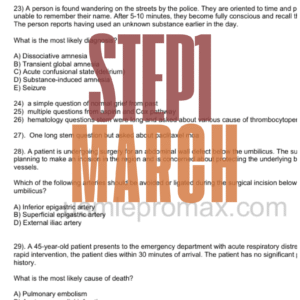 “USMLE Step 1 March 2025 High-Yield Recalls: Quick Review & Key Concepts”Original price was: $ 100.00.$ 80.00Current price is: $ 80.00.
“USMLE Step 1 March 2025 High-Yield Recalls: Quick Review & Key Concepts”Original price was: $ 100.00.$ 80.00Current price is: $ 80.00. -
Product on sale
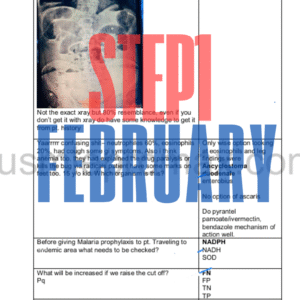 “Step 1 Recall February 2025: High-Yield Tips & Expert-Reviewed Strategies”Original price was: $ 100.00.$ 80.00Current price is: $ 80.00.
“Step 1 Recall February 2025: High-Yield Tips & Expert-Reviewed Strategies”Original price was: $ 100.00.$ 80.00Current price is: $ 80.00. -
Product on sale
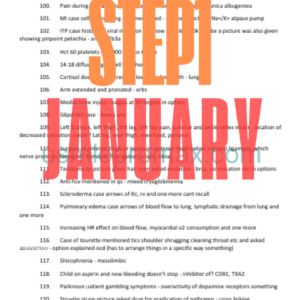 High-Yield Step 1 January 2025 Recalls: Expert-Reviewed Insights & Key TopicsOriginal price was: $ 90.00.$ 80.00Current price is: $ 80.00.
High-Yield Step 1 January 2025 Recalls: Expert-Reviewed Insights & Key TopicsOriginal price was: $ 90.00.$ 80.00Current price is: $ 80.00. -
Product on sale
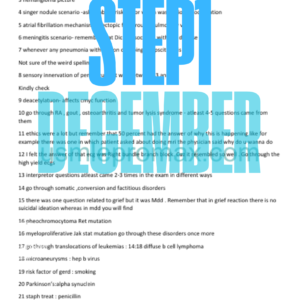 High-Yield Step 1 December Recalls: Must-Know Topics & Exam InsightsOriginal price was: $ 90.00.$ 80.00Current price is: $ 80.00.
High-Yield Step 1 December Recalls: Must-Know Topics & Exam InsightsOriginal price was: $ 90.00.$ 80.00Current price is: $ 80.00. -
Product on sale
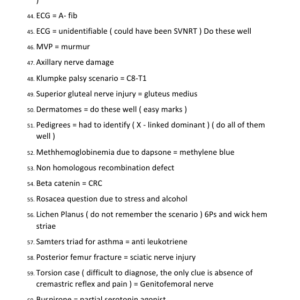 Step 1 November Recalls HY Bundle – Exclusive High-Yield Study PackOriginal price was: $ 90.00.$ 80.00Current price is: $ 80.00.
Step 1 November Recalls HY Bundle – Exclusive High-Yield Study PackOriginal price was: $ 90.00.$ 80.00Current price is: $ 80.00. -
Product on sale
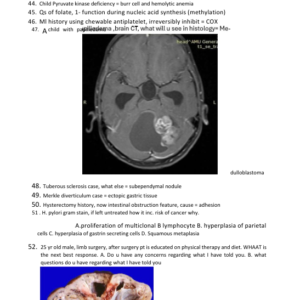 Exclusive Step 1 October Recalls Bundle – High Yield Study MaterialsOriginal price was: $ 80.00.$ 65.00Current price is: $ 65.00.
Exclusive Step 1 October Recalls Bundle – High Yield Study MaterialsOriginal price was: $ 80.00.$ 65.00Current price is: $ 65.00. -
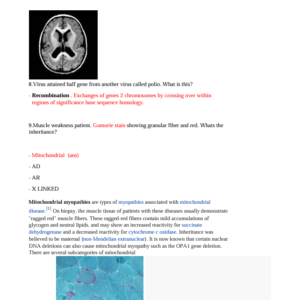 2024 Step 1 Comprehensive Recall Bundle | High-Yield USMLE Questions$ 389.99
2024 Step 1 Comprehensive Recall Bundle | High-Yield USMLE Questions$ 389.99 -
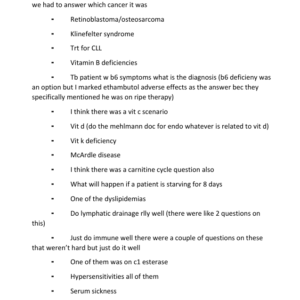 USMLE Step 1 Recalls for September 2024: High-Yield Questions and Insights”$ 80.00
USMLE Step 1 Recalls for September 2024: High-Yield Questions and Insights”$ 80.00 -
Product on sale
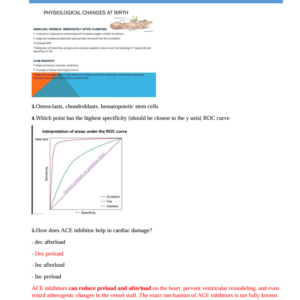 USMLE Step 1 Recalls May 2024: Full Month Bundle Post Pool ChangeOriginal price was: $ 100.00.$ 88.00Current price is: $ 88.00.
USMLE Step 1 Recalls May 2024: Full Month Bundle Post Pool ChangeOriginal price was: $ 100.00.$ 88.00Current price is: $ 88.00.
